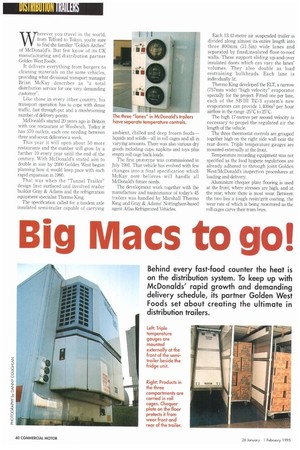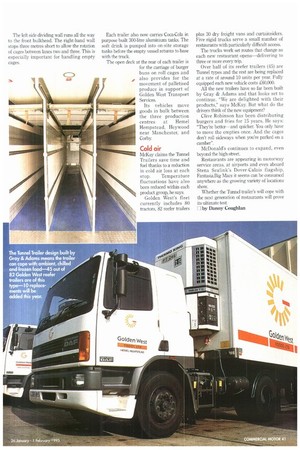Big Macs to go!
Page 44

Page 45

If you've noticed an error in this article please click here to report it so we can fix it.
Behind every fast-food counter the heat is on the distribution system. To keep up with McDonalds' rapid growth and demanding delivery schedule, its partner Golden West Foods set about creating the ultimate in distribution trailers.
Werever you travel in the world, from Telford to Tokyo, you're sure to find the familiar "Golden Arches" of McDonald's. But few know of its UK manufacturing and distribution partner Golden West Foods.
It delivers everything from burgers to cleaning materials on the same vehicles, providing what divisional transport manager Brian McKay describes as "a total distribution service for one very demanding customer".
Like those in every other country, his transport operation has to cope with dense traffic, fast through-put and a mushrooming number of delivery points.
McDonald's started 20 years ago in Britain with one restaurant at Woolwich. Today it has 570 outlets, each one needing between three and seven deliveries a week.
This year it will open about 50 more restaurants and the number will grow by a further 10 every year until the end of the century. With McDonald's stated aim to double in size by 2000 Golden West began planning how it would keep pace with such rapid expansion in 1990.
That was when the "Tunnel Trailer" design first surfaced and involved trailer builder Gray & Adams and the refrigeration equipment specialist Thermo King.
The specification called for a tandem axle insulated semi-trailer capable of carrying ambient, chilled and deep frozen foods— liquids and solids—all in roll cages and all in varying amounts. There was also various dry goods including cups, napkins and toys plus empty roll cage back-loads.
The first prototype was commissioned in July 1991. That vehicle has evolved with few changes into a final specification which McKay now believes will handle all McDonald's future needs.
The development work together with the manufacture and maintenance of today's 45 trailers was handled by Marshall Thermo King and Gray & Adams' Nottingham-based agent Atlas Refrigerated Vehicles. Each 13.42-metre air suspended trailer is divided along almost its entire length into three 800mm (31.5in) wide lanes and separated by fixed,insulated floor-to-roof walls. These support sliding up-and-over insulated doors which can vary the lanes' volumes. They also double as load restraining bulkheads. Each lane is individually lit.
Thermo King developed the ELT, a narrow (757mm wide) "high velocity" evaporator specially for the project. Fitted one per lane, each of the SB-III TC-3 system's new evaporators can provide 1,400m3 per hour airflow in the range -25°C to 25°C.
The high 17-metres per second velocity is necessary to propel the regulated air the length of the vehicle.
The three thermostat controls are grouped together high on the right side wall near the rear doors. Triple temperature gauges are mounted externally at the front.
Temperature recording equipment was not specified as the food hygiene regulations are already adhered to through joint Golden West/McDonald's inspection procedures at loading and delivery.
Aluminium chequer plate flooring is used at the front; where stresses are high, and at the rear; where there is most wear. Between the two lies a tough resin/grit coating, the wear rate of which is being monitored as the roll cages carve their tram lines. The left side dividing wall runs all the way to the front bulkhead. The right-hand wall stops three metres short to allow the rotation of cages between lanes two and three. This is especially important for handling empty cages.
Each trailer also now carries Coca-Cola in purpose built 300-litre aluminium tanks. The soft drink is pumped into on-site storage tanks before the empty vessel returns to base with the n-uck.
The open deck at the rear of each trailer is for the carriage of burger buns on roll cages and also provides for the movement of palletised produce in support of Golden West Transport Servicas.
Its vehicles move goods in bulk between the three production centres at Hemel Hempstead, Heywood near Manchester, and Corby
Cold air
McKay claims the Tunnel Trailers save time and fuel thanks to a reduction in cold air loss at each stop. Temperature fluctuations have also been reduced within each product group, he says.
Golden West's fleet currently includes 80 tractors, 82 reefer trailers plus 30 dry freight vans and curtainsiders. Five rigid trucks serve a small number of restaurants with particularly difficult access.
The trucks work set routes that change as each new restaurant opens—delivering to three or more every trip.
Over half of its reefer trailers (45) are Tunnel types and the rest are being replaced at a rate of around 10 units per year. Fully equipped each new vehicle costs £60,000.
All the new trailers have so far been built by Gray & Adams and that looks set to continue. "We are delighted with their products," says McKay. But what do the drivers think of the new equipment?
Clive Robinson has been distributing burgers and fries for 15 years. He says: "They're better—and quicker. You only have to move the empties once. And the cages don't roll sideways when you're parked on a camber".
McDonald's continues to expand, even beyond the high street.
Restaurants are appearing in motorway service areas, at airports and even aboard Stena Sealink's Dover-Calais flagship, Fantasia.Big Macs it seems can be consumed anywhere as the growing variety of locations show.
Whether the Tunnel trailer's will cope with the next generation of restaurants will prove its ultimate test.
Fl by Danny Coughlan




























































































